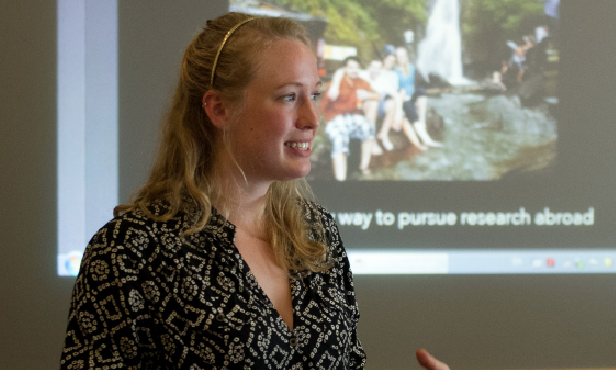Alumna Describes Fulbright Experience
Phoebe Oldach ’13 speaks about the research she conducted while at the University of New Delhi.
The Fulbright Program gives students around the country the opportunity to conduct research abroad, in order to help foster their interests as well as their academic goals. For recent graduate Phoebe Oldach ’13, this opportunity meant going abroad to the University of New Delhi to research the “bacterial remediation of the chemical hexachlorocyclohexane (HCH).” According to Oldach, this remediation “is widespread around the globe due to the insecticidal characteristics of its gamma isomer.” Oldach presented both her research and advice to current and prospective Fulbright applicants at a talk during Common Hour on Tuesday, September 22nd.
When asked about the methods she used to conduct her research, Oldach commented, “I did this by studying microbial populations at a massive HCH dumpsite in Lucknow, Uttar Pradesh, India, and by using genomics techniques to investigate the lin catabolic system.” Oldach explained that this system “is evolving in bacteria present at the dumpsites and allows for the degradation of otherwise-recalcitrant HCH.” However, the explanation of her research lasted for only about half of her talk, as many students in attendance had questions about the Fulbright program, and about her abroad experiences.
Oldach touched on many of these topics and offered advice to potential scholars. As she said, “I think what is most important is to have fun with the application. Fulbright offers a unique opportunity for students to be wildly creative in thinking about what really interests and drives them, both in terms of academic topics and geographic location.”
Another point she stressed throughout the lecture was the fluidity of Fulbright. The program allows scholars to adapt their research to developing interests while abroad. However, the one aspect of the program that cannot change is the project with which you are affiliated. She said, “For many people, the affiliation shaped their experience, and while projects are highly subject to change, it is much more challenging to change affiliations (at least in India, where they are involved even in your visa application and registration).”
Moreover, she discussed possible back up plans for applicants: “More future-oriented advice includes preparations so you can be fully present and engaged in the experience once you are ‘in country.’ If I could change anything, I would have started learning Hindi, taken the GRE, and applied to graduate schools before going abroad.”
Oldach expressed her gratitude to both the College and to the program itself. As she stated, “I would like to express that I am incredibly grateful to the Fulbright program, to the Dickinson faculty and staff who helped me to think about the opportunity and to polish my application, and to Professor Rup Lal and the members of his lab, who graciously hosted me and shared with me innumerable gems of knowledge and know-how, ranging in topic from the scientific to the cultural and linguistic.”






